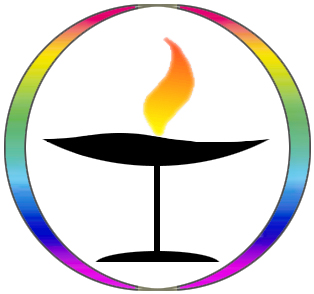UU Principles & Purposes
Our Principles
We, the member congregations of the Unitarian Universalist Association, covenant to affirm and promote
- The inherent worth and dignity of every person;
- Justice, equity and compassion in human relations;
- Acceptance of one another and encouragement to spiritual growth in our congregations;
- A free and responsible search for truth and meaning;
- The right of conscience and the use of the democratic process within our congregations and in society at large;
- The goal of world community with peace, liberty, and justice for all;
- Respect for the interdependent web of all existence of which we are a part;
- Journeying toward spiritual wholeness by working to build a diverse multicultural Beloved Community by our actions that accountably dismantle racism and other oppressions in ourselves and our institutions.
The living tradition which we share draws from many sources:
- Direct experience of that transcending mystery and wonder, affirmed in all cultures, which moves us to a renewal of the spirit and an openness to the forces which create and uphold life;
- Words and deeds of prophetic women and men which challenge us to confront powers and structures of evil with justice, compassion, and the transforming power of love;
- Wisdom from the world’s religions which inspires us in our ethical and spiritual life;
- Jewish and Christian teachings which call us to respond to God’s love by loving our neighbors as ourselves;
- Humanist teachings which counsel us to heed the guidance of reason and the results of science, and warn us against idolatries of the mind and spirit.
- Spiritual teachings of earth-centered traditions which celebrate the sacred circle of life and instruct us to live in harmony with the rhythms of nature.
Grateful for the religious pluralism which enriches and ennobles our faith, we are inspired to deepen our understanding and expand our vision. As free congregations we enter into this covenant, promising to one another our mutual trust and support.
Our Symbol: The Flaming Chalice
 The flaming chalice is the most central symbol in Unitarian Universalism. Almost all of the thousand-plus congregations in the Unitarian Universalist Association (UUA) light a chalice each Sunday morning during worship. Similarly, we light a chalice at weddings, child dedications, and memorial services. Often a church’s chalice is a gift from one of its members or one of its ministers. Made of clay, wood, metal, or glass—large and small—the chalices vary widely in their style. However, each is at its essence a cup with a flame inside it. When we light the chalice at First Parish in Concord, we acknowledge how this act joins us with all other Unitarian Universalists in our country and around the world. For us, the flaming chalice a symbol of truth and beauty. It is the light of peace and justice. It is a sign of our quest for meaning. It is a beacon of our love.
The flaming chalice is the most central symbol in Unitarian Universalism. Almost all of the thousand-plus congregations in the Unitarian Universalist Association (UUA) light a chalice each Sunday morning during worship. Similarly, we light a chalice at weddings, child dedications, and memorial services. Often a church’s chalice is a gift from one of its members or one of its ministers. Made of clay, wood, metal, or glass—large and small—the chalices vary widely in their style. However, each is at its essence a cup with a flame inside it. When we light the chalice at First Parish in Concord, we acknowledge how this act joins us with all other Unitarian Universalists in our country and around the world. For us, the flaming chalice a symbol of truth and beauty. It is the light of peace and justice. It is a sign of our quest for meaning. It is a beacon of our love.
The history of the chalice symbol
Hans Deutsch, an Austrian artist, first brought together the chalice and the flame as a Unitarian symbol during his work with the Unitarian Service Committee during World War II. To Deutsch, the image had connotations of sacrifice and love. Unitarian Universalists today have many different interpretations of the flaming chalice, including the light of reason, the warmth of community, and the flame of hope. (Source: UUA.org)
Our Purposes
The Unitarian Universalist Association shall devote its resources to and exercise its corporate powers for religious, educational and humanitarian purposes. The primary purpose of the Association is to serve the needs of its member congregations, organize new congregations, extend and strengthen Unitarian Universalist institutions and implement its principles.
The Association declares and affirms its special responsibility, and that of its member societies and organizations, to promote the full participation of persons in all of its and their activities and in the full range of human endeavor without regard to race, color, sex, disability, affectional or sexual orientation, age, or national origin and without requiring adherence to any particular interpretation of religion or to any particular religious belief or creed.
Nothing herein shall be deemed to infringe upon the individual freedom of belief which is inherent in the Universalist and Unitarian heritages or to conflict with any statement of purpose, covenant, or bond of union used by any society unless such is used as a creedal test.
This material is adapted from the Unitarian Universalist Association website.


You must be logged in to post a comment.